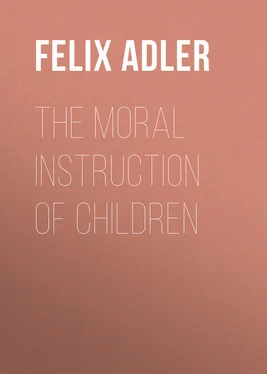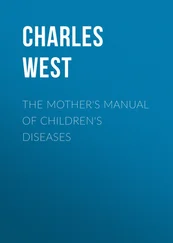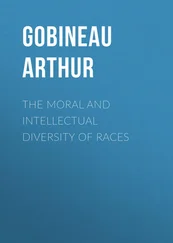Felix Adler - The Moral Instruction of Children
Здесь есть возможность читать онлайн «Felix Adler - The Moral Instruction of Children» — ознакомительный отрывок электронной книги совершенно бесплатно, а после прочтения отрывка купить полную версию. В некоторых случаях можно слушать аудио, скачать через торрент в формате fb2 и присутствует краткое содержание. Жанр: foreign_language, foreign_antique, foreign_prose, на английском языке. Описание произведения, (предисловие) а так же отзывы посетителей доступны на портале библиотеки ЛибКат.
- Название:The Moral Instruction of Children
- Автор:
- Жанр:
- Год:неизвестен
- ISBN:нет данных
- Рейтинг книги:3 / 5. Голосов: 1
-
Избранное:Добавить в избранное
- Отзывы:
-
Ваша оценка:
- 60
- 1
- 2
- 3
- 4
- 5
The Moral Instruction of Children: краткое содержание, описание и аннотация
Предлагаем к чтению аннотацию, описание, краткое содержание или предисловие (зависит от того, что написал сам автор книги «The Moral Instruction of Children»). Если вы не нашли необходимую информацию о книге — напишите в комментариях, мы постараемся отыскать её.
The Moral Instruction of Children — читать онлайн ознакомительный отрывок
Ниже представлен текст книги, разбитый по страницам. Система сохранения места последней прочитанной страницы, позволяет с удобством читать онлайн бесплатно книгу «The Moral Instruction of Children», без необходимости каждый раз заново искать на чём Вы остановились. Поставьте закладку, и сможете в любой момент перейти на страницу, на которой закончили чтение.
Интервал:
Закладка:
1. The teaching of science lends itself to the cultivation of truthfulness. Truthfulness may be defined as the correspondence between thought and word and fact. When the thought in the mind fits the fact, and the word on the tongue fits the thought, then the circuit of truth is complete. Now, with respect to the inculcating of truthfulness, science teaching has this advantage above other branches, that the palpable nature of the facts dealt with makes it possible to note and check the least deviation from the truth. The fact is present, right before the pupil, to rebuke him if he strays from it in thought or speech. And this circumstance may be utilized even in the humble beginnings of science teaching, in the so-called object-lessons. For instance, a bird, or the picture of one, is placed before the child. The teacher says, "Observe closely and tell me exactly what you see – the length of the neck, the curve of the beak, the colors of the plumage," etc. The pupil replies. The teacher objects: "You have not observed accurately. The color is not what you describe it to be. Look again. The curve of the beak does not resemble what you have just drawn on the blackboard. You must tell me exactly what you see. Your words must tally with the facts." And the same sort of practice may be continued in the science-lessons of the upper classes.
Scientists are distinguished from other observers by their greater accuracy. Intellectual honesty is that moral quality which science is best calculated to foster. All the great scientists have been haunted by a high ideal of truth, and a gleam of that ideal, however faint, may be made to shed its light even into the school-room. It is obvious that this realistic tutoring into veracity will be of special use to children who are led into lying by a too vivid imagination.
Let me add the following remarks in regard to indirect means of promoting truthfulness: The teacher can do a great deal to cultivate respect for the truth among his pupils by frankly admitting an error whenever he has fallen into one. Some teachers try to save their dignity by glossing over their mistakes. But even young children are shrewd enough to estimate such trickery at its worth; while he who manfully confesses that he has been in the wrong, earns the respect of his class, and sets them an invaluable example.
It is well also to observe strict accuracy even in matters which of themselves are of no moment. For instance, in giving an account of a botanizing expedition, you begin, perhaps, by saying, "It was half-past ten when we arrived at our destination." Suddenly you stop and correct yourself. "No, I was mistaken; it could not have been later than ten o'clock." Does this strike you as pedantic? But if you fix the time at all, is it not worth while to fix it with approximate exactness? True, it makes no difference in regard to what you are about to relate, whether you arrived at half-past ten or at ten. But, precisely because it makes no difference, it shows the value which you set on accuracy even in trifles. And by such little turns of phrase, by such insubstantial influences, coming from the teacher, the pupil's character is molded.
2. The study of history , when properly conducted is of high moral value. History sets before the mind examples of heroism, of self-sacrifice, of love of country, of devotion to principles at the greatest cost. How can such examples fail to inspire, to ennoble, to awaken emulation? The great and good men of the past, the virtuous and the wise, serve as models to the young, and often arouse in them an enthusiastic admiration, a passionate discipleship. In the next place, the study of history may be used to exercise the moral judgment. The characters which history presents are not all good; the characters even of the good are by no means faultless. It is in the power of the teacher to train the moral judgment and to increase the moral insight of his pupils by leading them to enter into the motives, and to weigh the right and wrong of the actions which history reports. He will also find many an occasion to warn against being dazzled by brilliant success to such a degree as to condone the moral turpitude by which it is often bought. The study of history can thus be made the means of enlightening the conscience as well as of awakening generous aspirations – but, let me hasten to add, only in the hands of a teacher who is himself morally mature, and fully imbued with the responsibilities of his task. Lastly, the study of history among advanced pupils may be used to confirm the moral idea of the mission of mankind, and to set it in its true light. The human race, as, from the moral point of view, we are bound to assume, exists on earth in order to attempt the solution of a sublime problem – the problem of the perfect civilization, the just society, the "kingdom of God." But on every page of history there are facts that warn us that progress toward this high ideal is of necessity slow. Whether we review the evolution of religion, or of political institutions, or of industrial society, we are still forced to the same solemn conclusion, that in view of the ultimate goal, "a thousand years are as a day," and that while we may not relax our efforts to attain the ideal, we must be well content in case we are permitted to advance the mighty work even a little. This conviction is calculated to engender in us a new spirit of piety and self-abnegation, which yet is consistent with perfect alacrity in discharging the duty of the hour.
There could be no better result from the study of history among young men and young women than if it should have the effect of impressing on them this new piety, this genuine historic sense, in which the average citizen, especially of democratic communities, is so conspicuously deficient. But this is a digression which I must ask you to pardon.
3. The moral value of the study of literature is as great as it is obvious. Literature is the medium through which all that part of our inner life finds expression which defies scientific formulation. In the text-books of science we possess the net result of the purely intellectual labors of the past; in universal literature we have composite photographs, as it were, of the typical hopes, sentiments, and aspirations of the race. Literature gives a voice to that within us which would otherwise remain dumb, and fixity to that which would otherwise be evanescent. The best literature, and especially the best poetry, is a glass in which we see our best selves reflected. There is a legend which tells of two spirits, the one an angel, the other a demon, that accompany every human being through life, and walk invisibly at his side. The one represents our bad self, the other our better self. The moral service which the best literature renders us is to make the invisible angel visible.
4. I can but cast a cursory glance at some of the remaining branches of instruction.
Manual training has a moral effect upon the pupil, of which I have spoken at some length on another occasion. 4 4 In the address on the subject, reprinted in the Appendix.
Music , apart from its subtler influences, which can not be considered here, has the special function of producing in the pupil a feeling of oneness with others, or of social unity. This is best accomplished through the instrumentality of chorus singing, while particular moral sentiments, like charity, love of home, etc., can be inculcated by means of the texts.
Gymnastic exercises likewise have a moral effect in promoting habits of self-control, prompt obedience at the word of command, etc. Indeed, it is not difficult to show the moral bearings of the ordinary branches of instruction. It would, on the contrary, be difficult to find a single one, which, when rightly viewed, is not surrounded by a moral photosphere.
Читать дальшеИнтервал:
Закладка:
Похожие книги на «The Moral Instruction of Children»
Представляем Вашему вниманию похожие книги на «The Moral Instruction of Children» списком для выбора. Мы отобрали схожую по названию и смыслу литературу в надежде предоставить читателям больше вариантов отыскать новые, интересные, ещё непрочитанные произведения.
Обсуждение, отзывы о книге «The Moral Instruction of Children» и просто собственные мнения читателей. Оставьте ваши комментарии, напишите, что Вы думаете о произведении, его смысле или главных героях. Укажите что конкретно понравилось, а что нет, и почему Вы так считаете.












